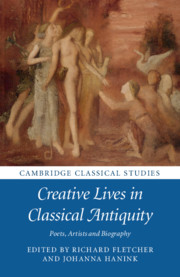Book contents
- Frontmatter
- Contents
- List of contributors
- List of illustrations
- Part I Opening remarks
- Part II Reviving dead poets
- Part III Lives in unexpected places
- 5 A poetic possession: Pindar's Lives of the poets
- 6 What's in a Life? Some forgotten faces of Euripides
- 7 Lives from stone: epigraphy and biography in classical and Hellenistic Greece
- Part IV Laughing matters and Lives of the mind
- Part V Portraits of the artist
- Works cited
- Index
5 - A poetic possession: Pindar's Lives of the poets
from Part III - Lives in unexpected places
Published online by Cambridge University Press: 01 December 2016
- Frontmatter
- Contents
- List of contributors
- List of illustrations
- Part I Opening remarks
- Part II Reviving dead poets
- Part III Lives in unexpected places
- 5 A poetic possession: Pindar's Lives of the poets
- 6 What's in a Life? Some forgotten faces of Euripides
- 7 Lives from stone: epigraphy and biography in classical and Hellenistic Greece
- Part IV Laughing matters and Lives of the mind
- Part V Portraits of the artist
- Works cited
- Index
Summary
What does it mean to write a life? For most of us, our initial tendency is to conceive of biography in terms of genre. We look, with Momigliano, for ‘an account of the life of a man from birth to death’. But Aristotle's insight that the full span of a single life is not the only, or best, means of achieving a totality is no less relevant to the study of biography than to the epics about which the judgement was originally conceived. The form of a biography is as important as the content narrated therein; it puts forth an implicit definition of the idea of a ‘life’. In the creative spirit of this volume's title, we would do well to broaden the category of ancient biography to include less traditional forms of life writing. Here I present my case for doing so in the form of one very particular example: I propose the great fifth-century lyric poet Pindar for inclusion among the ranks of ancient biographers.
Recent years have seen a welcome broadening of our approach to life writing in the ancient world. As we have moved away from judgements based on rigid historical criteria, we have come to appreciate the creativity and literary insight that helped to shape the many poetic bioi that have been preserved alongside the texts from which they stem and which they were designed to illuminate. Guided by the work of Fairweather, Lefkowitz and Graziosi, we have come to view the ancient bioi as records of a rich literary-critical history that has, for the most part, been lost to us. In presenting us with poetic lives, the writers of the bioi offer a special type of literary analysis: biographical interpretation. Modern students of Pindar have much to learn from the insightful analysis of his ancient biographers, and attention to the seemingly peculiar aspects of the tradition can serve as a welcome corrective to modern conventional wisdom. Pindar's early success in Athens, for instance, which is given great prominence in the Ambrosian Vita, does not figure into most modern accounts, whether explicitly or implicitly. The stark contrast should serve as a healthy reminder that our contemporary assumptions about the stylistic (epinician), social (aristocratic) and geographic (Sicilian and Aeginetan) preferences of the lyric poet were not shared by an ancient audience who may have best known Pindar through his dithyrambic compositions.
- Type
- Chapter
- Information
- Creative Lives in Classical AntiquityPoets, Artists and Biography, pp. 103 - 128Publisher: Cambridge University PressPrint publication year: 2016
- 1
- Cited by



